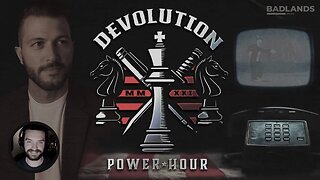Premium Only Content

Assurance of Salvation in 1 John: Tests of Life: Righteousness, Love & True Belief Show New Birth
How can a believer receive assurance of salvation? Thomas Ross explains the teaching of the epistle of 1 John, which supplies tests of spiritual life: righteousness, love, and true belief prove that one has been born again or is regenerate.
The Gospel of John climaxes with Christ’s revelation of Himself as the risen Lord to Thomas, and Thomas’s faithful surrender to Christ as Lord and God, a picture of the nature of saving faith, which includes surrender to Christ as God and Lord as well as faith in His cross and resurrection (John 20:28-31). This is part of what is involved in believing that Jesus is the Christ, and that in believing receiving life through Christ’s name. John 20:31 sets forth a dual purpose to the Gospel; first, the reception of spiritual life at the moment of believing in the Lord Jesus, and, secondly, that through continuing growth in faith, through deeper believing, the Christian might grow in his measure of spiritual life (e. g., the present participle “believing” in “that believing ye might have life”).
The purpose statement of 1 John is likewise found near the end of the book, namely, in 1 John 5:13:
1John 5:13 These things have I written unto you that believe on the name of the Son of God; that ye may know that ye have eternal life, and that ye may believe on the name of the Son of God.
The Apostle John wrote 1 John to those who were believers, in order that they might “know” that they had eternal life—that is, in order that they might possess assurance of salvation. Furthermore, through their possession of assurance, their faith in Christ would grow deeper—as they “know that ye have eternal life,” the result is deeper faith, “that ye may believe on the name of the Son of God.”
1 John, then, is the book of assurance of salvation—of “knowing” that one has eternal life.
Eternal security refers to the believer’s unchanging standing in the sight of God. All Christians, from the strongest to the weakest, are certain to enter the New Jerusalem. Their justification cannot be lost. This state, eternal security, does not depend upon the believer’s actions, feelings, or thoughts, but upon God’s purposes and grace alone. Every born-again Christian has eternal security, whether he knows it or not, whether he feels saved or not. Assurance, by contrast, as discussing in this sermon, refers to how the believer “knows” that he has eternal life. All believers are secure, but not all believers have assurance of salvation, and not all believers have assurance to the same degree. Believers who lack assurance can get it, and those who have it can lose it. Assurance refers not to the believer’s standing before God, but to his knowledge of his standing. Personal assurance of salvation is not of the essence of saving faith, but it is of the well-being of saving faith—as we can see in 1 John 5:13, those who “know” that they have eternal life are thus able to believe more deeply in the Son of God, and we know from John 20:28-31 that deeper faith in the Son of God brings a greater measure of spiritual life. God wants believers to have assurance.
For the overwhelming majority of church history, 1 John has been viewed as describing tests of life—that is, identifying marks that all believers possess. These marks are more evident in some believers than in others, but they all are present in every true child of God. The Apostle John points out what these marks are, and states that those who have them can “know” that they have eternal life because only true believers can possess these marks, while no unbeliever can truly have them. This is the Biblical (and Baptist) view of 1 John.
Two other views—very dangerous and very false views—that have in recent times crept into independent Baptist churches. The first false view is that those who repeat the sinner’s prayer or ask Jesus to come into their heart should have assurance of salvation because they did so. Jack Hyles taught this false view, as do many evangelicals.
The second false view is that assurance of salvation has nothing to do with one’s life; no marks distinguish genuine believers from the unregenerate. 1 John allegedly only distinguishes a subcategory of Christians who are “abiding” and have entered into the Higher Life from the larger mass of Christians living on the lower plane who do not have the marks of 1 John. This heresy was popularized by Zane Hodges of Dallas Theological Seminary, who was a leading advocate of the anti-Lordship salvation (so-called) “free grace” movement.
The truth is that 1 John goes through three cycles, explaining that assurance comes from the Christian passing the tests of continuing righteousness, continuing love, and continuing belief. 1 John distinguishes those who have life from those who do not by explaining qualities essential to life itself, rather than distinguishing characteristics that divide abiding believers from allegedly non-abiding believers.
#1john #assuranceofsalvation #eternallife #preaching
-
 34:54
34:54
MattMorseTV
13 hours ago $26.01 earned🔴Trump just FIRED 154,000 FEDERAL WORKERS. 🔴
72.4K93 -
 2:03:32
2:03:32
Side Scrollers Podcast
21 hours agoMASSIVE Netflix Boycott + The TRUTH About Jimmy Kimmel’s Return + BIG Side Scrollers NEWS
35.6K15 -
 15:05
15:05
GritsGG
1 day agoFlawless Duos Victory w/ Most Winning Duo in Warzone History!
32.5K2 -
 1:53:52
1:53:52
FreshandFit
17 hours agoShe Was In 3 Domestic Violence Cases? Happy Birthday Fresh!!!
161K66 -
 2:03:22
2:03:22
Inverted World Live
9 hours agoThe Aliens Are Underwater | Ep. 117
78.8K29 -
 2:20:24
2:20:24
Badlands Media
17 hours agoDevolution Power Hour Ep. 394: The Long Game, Media Traps, and Military Signals
97.7K30 -
 2:08:38
2:08:38
TimcastIRL
12 hours agoNetflix Shares TANK, Elon Says BOYCOTT After Writer MOCKS Charlie Kirk Assassination
252K197 -
 8:48:01
8:48:01
SpartakusLIVE
13 hours agoI'M BACK || Quads w/ The Boys
95.4K9 -
 9:33
9:33
Ken LaCorte: Elephants in Rooms
16 hours ago $4.71 earnedWhy Do Black Men Love Big Butts?
41.3K26 -
 2:12
2:12
From Zero → Viral with AI
1 day ago $14.74 earned🚀 AI Marketing Isn’t Just for Big Brands Anymore — Here’s Why
55.9K11